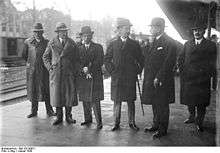István Bethlen
| Count István Bethlen de Bethlen | |
|---|---|
 | |
| 28th Prime Minister of the Kingdom of Hungary | |
|
In office 14 April 1921 – 24 August 1931 | |
| Monarch |
Miklós Horthy as Regent |
| Preceded by | Pál Teleki |
| Succeeded by | Gyula Károlyi |
| Member of the House of Representatives | |
|
In office 31 October 1901 – 16 November 1918 | |
|
In office 18 February 1920 – 2 February 1939 | |
| Personal details | |
| Born |
8 October 1874 Gernyeszeg, Kingdom of Hungary, Austria-Hungary (now Gornești, Romania) |
| Died |
5 October 1946 (aged 71) Moscow, Russian SFSR, Soviet Union |
| Nationality | Hungarian |
| Political party | Liberal Party, Independence Party of 48, Constitution Party, Unity Party, Party of National Unity |
| Spouse(s) | Countess Margit Bethlen de Bethlen |
| Profession | politician, jurist |
| Religion | Calvinism[1] |
Count István Bethlen de Bethlen (8 October 1874, Gernyeszeg – 5 October 1946, Moscow) was a Hungarian aristocrat and statesman and served as Prime Minister from 1921 to 1931.
Career
The scion of a noble Transylvanian family, Bethlen was elected to the Hungarian parliament as a Liberal in 1901.[2] Later, he served as a representative of the new Hungarian government at the Paris Peace Conference in 1919. In that year, the weak centrist Hungarian government collapsed, and was soon replaced by a communist Hungarian Soviet Republic, under the leadership of Béla Kun. Bethlen quickly returned to Hungary to assume leadership of the anti-communist "white" government based in Szeged, along with former Austro-Hungarian admiral Miklós Horthy. After the "white" forces seized control of Hungary, Horthy was appointed Regent. Bethlen again took a seat in the Hungarian parliament, allying with the conservative factions there.
After the attempted return of King Charles IV to the throne of Hungary in 1921, Horthy asked Bethlen to form a strong government to eliminate the possibility of other such threats to the new country. Bethlen founded the Party of National Unity. Through a system of ballot manipulation, handing out government jobs, and changing the electoral law to enfranchise supporters, he was able to form a political machine that was unstoppable in Hungarian politics. Bethlen was also able to unite the two most powerful factors in Hungarian society, the wealthy, primarily Jewish industrialists in Budapest and the old Magyar gentry in rural Hungary, into a lasting coalition; this effectively checked the rise of Fascism in the country for at least a decade. Bethlen was also able to reach an accord with the labor unions, earning their support for the government and eliminating a source of domestic dissent.

During his decade in office, Bethlen led Hungary into the League of Nations[3] and arranged a close alliance with Fascist Italy, even entering into a Treaty of Friendship with Italy in 1927, in order to further the nation's revisionist hopes.[4] He was, however, defeated in his attempts to change the Treaty of Trianon, which stripped Hungary of most of its territory after the First World War. The Great Depression shifted Hungarian politics to the extreme right, and Horthy replaced Bethlen with Gyula Károlyi,[5] followed quickly by Gyula Gömbös, a noted Fascist and antisemite.
Increasingly shunted into political obscurity, Bethlen stood out as one of the few voices in Hungary actively opposed to an alliance with Nazi Germany. As it became apparent that Germany was going to lose the Second World War, Bethlen attempted, unsuccessfully, to negotiate a separate peace with the Allied powers. By the spring of 1945 most of Hungary had fallen to the advancing Soviet troops. The communists, who returned with the Soviets, immediately began their scheme to take over the country. They saw the aging Bethlen as a threat, a man who could unite the political forces against them. For this they had him arrested by the Soviets in April 1945. Soon after, Bethlen was taken to Moscow,[6] where he died in prison on 5 October 1946.[7]
Notes
References
- Ignác Romsics: István Bethlen: A Great Conservative Statesman of Hungary, 1874–1946. East European Monographs. Columbia University Press, 1995.
- Bethlen Istvan Emlekirata, 1944, Published in Hungarian/Magyar by Zrinyi Katonai Koenyvkiado, 1988.
| Political offices | ||
|---|---|---|
| Preceded by Pál Teleki |
Prime Minister of Hungary 1921–1931 |
Succeeded by Gyula Károlyi |
| Preceded by Lajos Hegyeshalmi |
Minister of Finance Acting 1921 |
Succeeded by Tibor Kállay |
| Preceded by Emil Nagy |
Minister of Justice Acting 1924 |
Succeeded by Pál Pesthy |
| Preceded by Géza Daruváry |
Minister of Foreign Affairs Acting 1924 |
Succeeded by Tibor Scitovszky |
| Preceded by István Szabó de Nagyatád |
Minister of Agriculture Acting 1924 |
Succeeded by János Mayer |
| Preceded by Pál Pesthy |
Minister of Justice Acting 1929 |
Succeeded by Tibor Zsitvay |